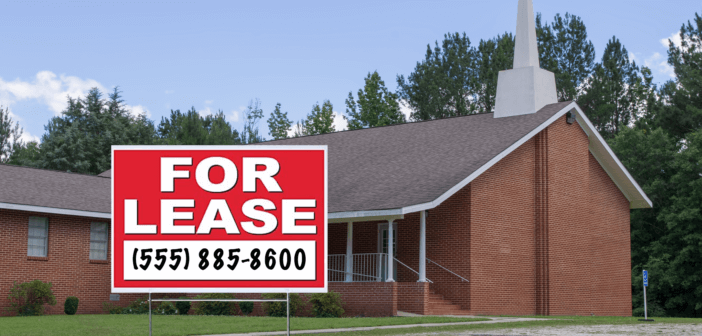Domenic Dutra says not every potential lessee makes a good partner. He lists critical questions and consideration for any congregation considering renting space in their building that promote a fruitful relationship.
Leasing space in your building could give your church new life. But it could also be part of your slow, painful death. Let me explain. While churches should seek to serve all people, not every group makes a good partner, let alone lessee. Sometimes the highest paying lessee could do the most harm to a church’s long-term life and impact. After all, if a shrinking congregation that’s doing less and less for the community stays afloat solely due to a high-paying lessee, everyone suffers. Churches must be selective and strategic as they pursue leasing agreements.
Greg Roth, a former pastor who successfully led Centerville Presbyterian Church through numerous community engagement efforts, understands the importance of linking mission with all aspects of congregational leasing activity. He argues that before considering a formal leasing relationship, it’s important to enter a period of discernment. When church leaders are approached by a group or ministry that wishes to lease space, they must value relationships over revenue. Pastor Roth encourages spending time together, outside of business meetings and negotiations, to see how your teams interact.
Sharing certain values and seeking out similar, productive community interests promises the most potential. But compatibility isn’t enough. Your church can formally evaluate interested lessees to determine if they’re a good fit for your congregation by asking these three questions:
1. Does partnering with this group enable you to further expand the love of Christ?
Kingdom diversity is good! But fruitful diversity should exist under the larger umbrella of loving, ethical agendas. By having a lessee with a complementing mission, versus one that’s competing or overlapping, your church can support this work while expanding the impact and influence of your people beyond what it could on its own.
2. Does the group have a good reputation in the community?
Even if a lessee may not be well-established or well-known — maybe they’re a church plant or new non-profit — someone knows them. Ask for personal references, look at their social media, and even visit their current location. Whenever possible, conduct background checks and run credit reports. Due diligence is important, especially in early conversations.
3. What value does the lessee see in sharing space with your specific church?
Maybe it’s your location, mission, surrounding demographics, or reputation that draws lessees to you. It’s important to establish early on what value each party values in the arrangement. As you discern these answers in conversations, you’ll want to see how your potential lessee intends to grow the Kingdom and love others. If that vision aligns with your congregation, you’re set up for success.
But finding a lessee who is a good fit for your organization isn’t the end of this process. You, as a church, must also have clear ideas around the whys and hows of leasing. Consider the following steps as you evaluate whether your church should move forward with leasing:
Legal and financial precautions
Partnering with other nonprofits or ministries should be relational, but this does not preclude the importance of preparing legally enforceable agreements that both parties understand and agreed to abide by. If you don’t have the time or resources to take this step, wait to pursue leasing until you do.
Defined expectations
Lessees are not saviors. They won’t magically fill your pews or curb your spending. But their presence may bring some financial relief in addition to new energy and vitality into your buildings. The financial relief must not be the goal but rather a by-product of sustained and committed missional actions.
Congregational leaders often assume too much overlap in perspective or ethical commitments with potential lessees. Establish what values or priorities are most important for your lessee to share; these can be theological positions or even the frequency of maintenance or cleaning. Whatever feels most important to your church. Don’t rush into leasing without these ideas clearly outlined and discussed.
Relationships
This isn’t just about business — it’s about relationships. Do you have the interest and capacity to establish strong personal connections which will ensure consistent, open communication? Lessees become like neighbors, so the stronger the relationship, the more you have to talk about and — even better — the more you have to fall back on when conflict inevitably arises. If you’re not prepared to make this investment, it might not be time to lease.
Leasing is a great way to impact a community through partnerships with groups that actively serve in complementary ways. With some forethought, grace, and personal attention to detail, this process can be one driven by long-term mission instead of shortsighted desperation.
 Domenic Dutra is author of Closing Costs: Reimagining Church Real Estate for Missional Purposes, available at Cokesbury and Amazon.
Domenic Dutra is author of Closing Costs: Reimagining Church Real Estate for Missional Purposes, available at Cokesbury and Amazon.
Related Resources
- Should Your Church Consider Selling Property? by Domenic Dutra
- Before You Rent Church Space, Calculate the Costs by Partners for Sacred Places
- Using Your Building Assets by Rosario Picardo
- Building And Funding Your Capital Budget Video Tool Kit






